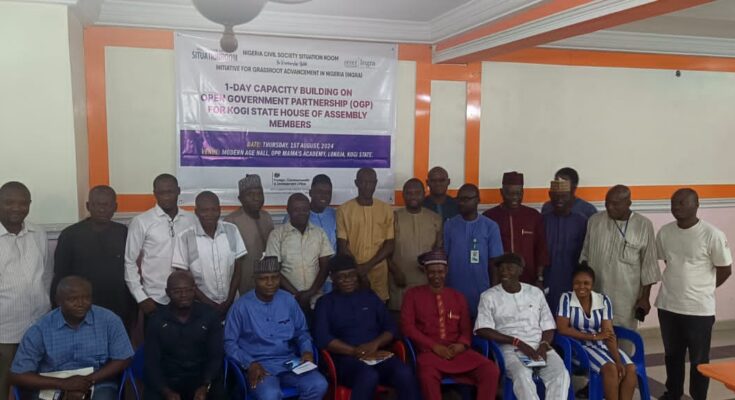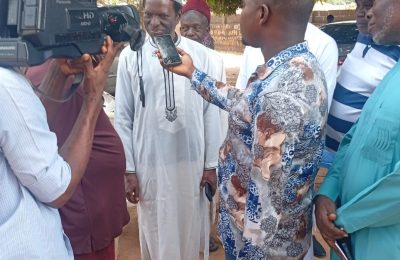- *BY IDRIS MILIKI ABDUL*
Executive Director,
Conscience for Human Rights and Conflict Resolution (CHRCR)
*A PAPER PRESENTED AT A*
1-DAY CAPACITY BUILDING ON OPEN GOVERNMENT PARTNERSHIP (OGP) FOR KOGI STATE HOUSE OF ASSEMBLY MEMBERS AND THEIR COMMITTEE CLEAKS
On 1ST August, 2024, At Lokoja, Kogi State.
*BACKGROUND:*
Open Government Partnership (OGP) is a global initiative, to encourage Accountability, Transparency through citizen’s participation.
In Kogi State, despite various efforts by Organisations and particularly Civil Society Organizations (CSOs) in advocating to government and its agencies to key into this global initiative, such efforts are yet to yield the desired results. However, there is an improvement in the efforts to get the OGP documents into reality through State Action Plan (SAP), that was developed by both State and Non-State Actors not too long ago. We also need to acknowledged that the current administrations in Kogi State that have signed into OGP. Although we are a bit worried that the State Executive Council is yet to approve the State Action Plan SAP documents.
Therefore, the need for new ideas and strategy(ies) to improve the ongoing efforts in getting government, Civil Society Organisations and the generality of the citizens to get involved in this laudable global concept towards improving Accountability and Transparency in governance cannot be overemphasized. Both the Executive, Legislative arms of government, even the Judiciary also have it own roles.
It has also been discovered in Kogi State that the level of awareness on the principle of OGP in the State is not encouraging. The need to intensify media strategy and build networks around OGP among stakeholders is crucial.
*OUR GOAL*
Our goal, is to get government to sign and build strategic partnership around the principle of OGP.
*OBJECTIVES*
– To encourage Accountability, Transparency and to reduce corruption in Kogi State.
– To mobilise Media institutions and Practitioners in reporting activities on OGP in Kogi State.
– To get the legislative arm of Government to key into all the efforts through legislative process.
*HISTORY OF OGP*
The Open Government Partnership was launched on 20th September, 2011 to provide an international platform for domestic reformers to make their governments more open, accountable and responsive to citizens.
Eight founding members: Brazil, Mexico, Indonesia, Phillipines, Norway, South Africa, United Kingdom, and United States.
Since the formal launching, the number of countries that have joined the partnership has grown to more than 70 representing more than a third of the world’s population.
Nigeria joined in July 2016 as the 70th country
*GUIDING PRINCIPLES OF OGP*
*Transparency:* Information on government activities and decisions is open, comprehensive, timely and freely available to the public, and meets basic open data standards.
*Accountability:* Rules, regulations, and mechanisms are in place that call upon government actors to justify their actions, act upon criticisms or requirements made of them and accept responsibility for failure to perform.
*Citizen Participation:* Governments seek to mobilize citizens to engage in public debate, provide input, and make contributions that lead to more responsive and effective governance.
*Technology and Innovation:* Governments embrace the importance of new technologies in driving innovation, providing citizens with open access to technology, and increasing their capacity to use technology.
*OGP IN NIGERIA*
– The OGP National Steering Committee (NSC) was recently constituted, with the Federal Ministry of Justice as the Coordinating Ministry and Co-chair
– As the OGP process requires 50 percent civil society participation, a co-chair was also nominated by the Civil Society Organisations.
– 30-month (Jan 2017 – June 2019) National Action Plan (NAP) Developed
– 3 states have so far signed up: Kaduna, Anambra and Kano
*GENERAL PRACTICE AND PROCEDURE OF LEGISLATIVE PROCESS*
Before the passing of a law, a legislative proposal in the form of a bill must be duly introduced to the House. And no bill, public or private, whether introduced by the government or a private member, can transform into law until it is duly received and approved by the legislature. Hence, the legislature must be opportune to consider all bills, both in general principle and detail, through a number of stages that take it through a House, in a unicameral legislature, or both Houses, in bicameral legislatures.
Every bill has a short title, which is normally the title by which the eventual Act will be cited, and a long title that summarizes the main purpose and content of such bill. The longer title must necessarily cover the main objects of the bill. Preambles set out the reason(s) for the introduction of a bill, while an enacting formula summary the legislative authority dealing with the enactment of such, and this is usually the legislature.
The main body of a bill is laid down in parts or chapters, with each part or chapter containing a number of clauses numbered consecutively. Prior to its final enactment into law, the parts or chapters of a bill are divided into ‘clauses’, which is the technical word used in bills; however, when it becomes enacted into law, the description of a bill’s constituent parts as ‘clauses’ is replaced by its description as ‘sections’. And such clauses are generally sub-divided into sub-sections, paragraphs and sub-paragraphs. Where there are schedules, these are also divided into paragraphs and sub-paragraphs; in bills, schedules are dependent on particular clauses existing in such bills.
A schedule would be relevant in the final analysis if its substantive clause is not expunged during the various amendments made to a proposed law. Bills vary in length in relation to the subjects or contents that they centre on; and it is usual practice to have an explanatory memorandum attached to it. While this is not a compulsory feature, wherever it is attached to a bill, its summaries the provisions of such bill, as well as the additional expenditure that might be consequent upon its enactment. The name of whoever, or names of those who, introduce(s) or present(s) a bill, as well as those who support it, and the date that it is ordered to be printed and its number, are inscribed on the back of the bill.
Although certain differences exist across legislatures in terms of the due process that a bill must go through in order to become an Act, there are quite a good number of similarities, which include relatively uniform practices and procedures that remain attractive and effective.
*FIRST READING*
The first reading has to do with the introduction of a bill to the members of a legislature, and this stage is purely formal as no debates are entertained on the bill. The Clerk of the House reads the short tide of the document, which is then deemed to have been read for the first time. After the reading, the bill is ordered to be printed, and the member(s) of the legislature who is/are presenting it for a second reading subsequently appoint(s) a day when this will come up. A record of the bill, as having being read for a first time, is made in the House journals, after which members of the House would be offered copies of the bill for study.
*SECOND READING*
This is perhaps the most important stage in the passing of a bill. On the appointed day, when the Clerk reads the order of the day for the second reading of the bill, the member(s) in charge will move the motion that the bill should be read a second time. This other reading permits a wide debate by legislators on the principle and purposes of the bill; what it does and what it does not do; as well the interests that the proposed legislation will affect. This is the stage when the opposition is allowed to make its case formally, and perhaps call for an amendment of the bill. And at the end of the second reading, the House must come to a decision on the projected legislation.
If the bill is read-through a second time, the House is deemed to have approved the bill in principle. Otherwise, if the second reading is defeated, then that serves as the end of the bill. It is not unusual for legislators to adopt courteous methods in dismissing a bill, but in practical terms, a rejected bill is often regarded as being “kicked by members as they went out of the legislative chamber”. In any case, at the conclusion of the debate after the second reading, a vote is taken on which there may or may not be a division. When a bill passes through its second reading, it then moves on to the committee stage.
*THE COMMITTEE STAGE*
The stage in which a bill is referred to a committee is of fundamental importance in the evaluation of that bill, as well as the role that House committees can play in the legislative process. At one extreme, a House can divest itself of its legislative prerogatives and hand them over to a committee, which then acts with full powers on behalf of the House. On the other hand, the House can pass a bill without referring it to any committee throughout the entire stages of the legislative process and, by so doing, maintain its legislative sanctity. The usual practice is found between these two extremes, in which case bills pass in-between the House and its committees, with each organ playing different but elated roles in relation to the bill.
When referred to a committee, a bill is considered in very close details. The committee goes through the proposed law clause-by- clause, line-by-line, and if necessary word-by-word. At this stage, the bill is either referred to a standing committee or to a committee of the whole House. Standing committees are usually constituted during every session of the legislature and each of these committees is designated to a different specialised area of operation. Almost all bills are referred to one standing committee of the House or another, except finance or appropriation bills that are traditionally referred to a committee of the whole House.
*OUT OF ORDER AMENDMENTS*
Numerous rules exist on amendments that are regarded as being out of order. Though some of these rules are present in most standing orders of legislative Houses, they also originate from established practice, and precedents that have been applied for many years.
*THE REPORT STAGE*
Upon the conclusion of its proceedings, a committee presents a formal report of this to the House. And where a bill was considered by a committee of the whole House, such bill is also reprinted, except the House decides against that and proceeds to other stages of the legislative process. A committee’s report to the House is merely an expression of opinion that might have a favorable or unfavorable impact on a bill.
Afterwards, the House proceeds to consider and amend the bill before it on a clause-by-clause basis. If the House cannot entertain the entire report in one sitting, this can be continued at subsequent sittings. And if it desires, the House may recommit the bill to a committee of the whole House, or a standing committee, which might be moved at the beginning or end of the report stage, or even during the third reading.
*THE THIRD READING*
At the third reading, a bill is either accepted or rejected by the House. And during this stage, the House merely decides whether to pass the bill into law or to reject it altogether. Usually, no debate is entertained on the proposed legislation at this point; and when it is allowed, the discussion is generally a very short one. If a bill is accepted, with or without amendment, after it is read to the House a third time, and subject to the assent of the President or Governor, then it can technically become an Act or Law. This is the process through which bills pass before becoming laws, except in bicameral legislatures. If a bill passes through a bicameral legislature successfully after a third reading, it is subsequently passed from the first to the second legislative House, where it goes through a process that is similar to what it went through in the earlier House.
*MY EXPERIENCE*
In working with the legislature is with mix feeling, it can be difficult but also rewarding at the same time. Out of three arms of government, the legislature as an institution is the most interesting and most accessible of all. Apart from the executive sessions that is exclusive for honorable members only other activities of the legislature are conducted in the open and members of the public interested in their works could make time out to witness their proceedings.
_*I have been part of Kogi State House of Assembly in the last sixteen years as a regular visitor to the house participating in their public hearing, and making written presentations, lobbying, monitoring proceeding and debating during their seating’s. The legislature as an arms of Government is an important institution that makes law for the citizenry and people should take interest in what is obtainable there, either at state or at national level. Laws are made for people to obey and if we fail to engage legislature to make good laws for the people, we shall be compel to obey whatever law or laws made by the legislators.*_
*CHALLENGES:*
The challenges of engagement with the legislature are enormous reasons be that those elected to that level of Government are politicians, with different value and interest, they have too many activities to attend to with many appointments, ranging from constituencies responsibilities, numerous meetings over sight functions make it difficult to see or get their attentions in most cases. Since they also regulate their own activities as an independent arm of government, they adjourn periodically without you known some time, which mean one will be forced to be in the Assembly in all seating days to be able to understand their activities.
*RECOMMENDATIONS*
The Legislature as an arm of Government that makes law for the good of the society and for the people and have special role to play on OGP.
1. They must be conversant with the rudiment and important of OGP by availing themselves with necessary information on OGP.
2. They have to incorporate OGP into their oversight functions
3. Necessary Laws must be made to promote the principles of OGP
4. Setup specific committee on OGP
5. Build a broad base partnership, particularly with the Civil Society Organizations (CSOs) to achieve the objectives and goals of OGP as a global concept.




